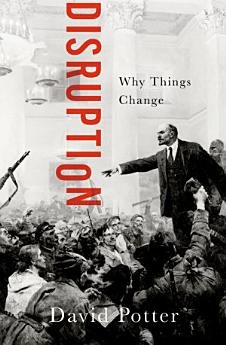Disruption: Why Things Change
2021 ജൂൺ · Oxford University Press
ഇ-ബുക്ക്
192
പേജുകൾ
family_home
യോഗ്യതയുണ്ട്
info
reportറേറ്റിംഗുകളും റിവ്യൂകളും പരിശോധിച്ചുറപ്പിച്ചതല്ല കൂടുതലറിയുക
shoppingmodeജൂലൈ 29-ന്, നിരക്കിൽ 40% കുറവായിരിക്കും
ഈ ഇ-ബുക്കിനെക്കുറിച്ച്
How do things change? The question is critical to the historical study of any era but it is also a profoundly important issue today as western democracies find the fundamental tenets of their implicit social contract facing extreme challenges from forces espousing ideas that once flourished only on the outskirts of society. This books argues that radical change always begins with ideas that took shape on the fringes. Throughout time the "mainstream" has been inherently conservative, allowing for incremental change but essentially dedicated to preserving its own power structures as the dominant ideology justifies existing relationships. In this tour of radical change across Western history, David Potter will show how ideologies that develop in opposition or reaction to those supporting the status quo are employed to effect profound changes in political structures that will in turn alter the way that social relations are constructed. Not all radical groups are the same, and all the groups that the book will explore take advantage of challenges that have already shaken the social order. They take advantage of mistakes that have challenged belief in the competence of existing institutions to be effective. It is the particular combination of an alternative ideological system and a period of community distress that are necessary conditions for radical changes in direction. The historical disruptions chronicled in this book-the rise of Christianity, rise of Islam, Protestant reformations, Age of Revolution (American and French), and Bolshevism and Nazism--will help readers understand when the preconditions exist for radical changes in the social and political order. As Disruption demonstrates, not all radical change follows paths that its original proponents might have predicted. An epilogue helps situate contemporary disruptions, from the rise of Trump and Brexit to the social and political consequences of technological change, in the wider historical forces surveyed by the book.
രചയിതാവിനെ കുറിച്ച്
David Potter is Francis W. Kelsey Collegiate Professor of Greek and Roman History and Arthur F. Thurnau Professor at the University of Michigan. His previous books include The Origin of Empire: Rome from the Republic to Hadrian, Constantine the Emperor, The Victor's Crown: A History of Ancient Sport from Homer to Byzantium, and Theodora: Actress, Empress, Saint.
ഈ ഇ-ബുക്ക് റേറ്റ് ചെയ്യുക
നിങ്ങളുടെ അഭിപ്രായം ഞങ്ങളെ അറിയിക്കുക.
വായനാ വിവരങ്ങൾ
സ്മാർട്ട്ഫോണുകളും ടാബ്ലെറ്റുകളും
Android, iPad/iPhone എന്നിവയ്ക്കായി Google Play ബുക്സ് ആപ്പ് ഇൻസ്റ്റാൾ ചെയ്യുക. ഇത് നിങ്ങളുടെ അക്കൗണ്ടുമായി സ്വയമേവ സമന്വയിപ്പിക്കപ്പെടുകയും, എവിടെ ആയിരുന്നാലും ഓൺലൈനിൽ അല്ലെങ്കിൽ ഓഫ്ലൈനിൽ വായിക്കാൻ നിങ്ങളെ അനുവദിക്കുകയും ചെയ്യുന്നു.
ലാപ്ടോപ്പുകളും കമ്പ്യൂട്ടറുകളും
Google Play-യിൽ നിന്ന് വാങ്ങിയിട്ടുള്ള ഓഡിയോ ബുക്കുകൾ കമ്പ്യൂട്ടറിന്റെ വെബ് ബ്രൗസർ ഉപയോഗിച്ചുകൊണ്ട് വായിക്കാവുന്നതാണ്.
ഇ-റീഡറുകളും മറ്റ് ഉപകരണങ്ങളും
Kobo ഇ-റീഡറുകൾ പോലുള്ള ഇ-ഇങ്ക് ഉപകരണങ്ങളിൽ വായിക്കാൻ ഒരു ഫയൽ ഡൗൺലോഡ് ചെയ്ത് അത് നിങ്ങളുടെ ഉപകരണത്തിലേക്ക് കൈമാറേണ്ടതുണ്ട്. പിന്തുണയുള്ള ഇ-റീഡറുകളിലേക്ക് ഫയലുകൾ കൈമാറാൻ, സഹായ കേന്ദ്രത്തിലുള്ള വിശദമായ നിർദ്ദേശങ്ങൾ ഫോളോ ചെയ്യുക.








